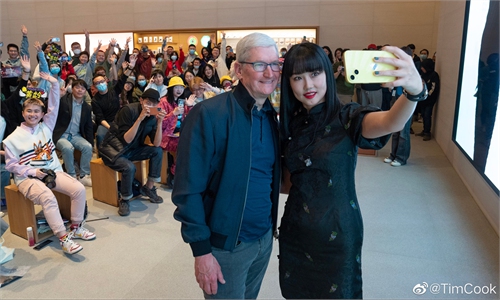
A snapshot of a local shopping street in Suzhou, East China's Jiangsu Province Photo: VCG
US companies have stepped up their presence in China after the summit between the top leaders of the two countries last week in San Francisco. Chinese observers said it reflects the strong willingness of US business community to bet on China amid stabilizing China-US ties, casting a vote of confidence in China's long-term economic growth.
The observers expressed cautious optimism in future economic and trade relations between the world's two largest economies. They urged the US to abandon trade unilateralism, economic coercion and power politics so that the two nations could return to the track of globalization and win-win cooperation for the long-term benefit of the world.
McDonald's said on Monday that it would acquire 28 percent stake of investment firm Carlyle in a partnership that manages its business in the Chinese mainland and Hong Kong and Macao special administrative regions, as the company aspires to explore more opportunities in the Chinese market.
According to data provided by the fast food giant, China is McDonald's second largest market, and it aims to open a total of more than 10,000 outlets in China by 2028.
Meanwhile, US payment company Mastercard's Chinese joint venture told the Global Times on Monday that it will offer yuan denominated bank cards under the Mastercard brand soon, and support card holders to make payments involving more than 100 million vendors in China and abroad.
The US enterprises' expansion plans in Chinese market showcases the attraction of China as one of the world's largest consumer markets and the vast potential of China-US economic and trade cooperation, observers said.
"The swift response by McDonalds, Mastercard and others reflect that the consensuses reached by the two countries' leaders during the recent summit which has helped inject renewed confidence into Chinese and US enterprises by stabilizing their expectations," Bao Jianyun, director of the Center for International Political Economy Studies at Renmin University of China, told the Global Times.
Thawing relations
The announcements are in line with the trend of thawing relations between Beijing and Washington, since China-US economic and trade cooperation is win-win, while "decoupling" yields no winners, Bao said.
More importantly, the world's second largest economy has entered a stage of high-quality development, and its stable economic growth will provide vast opportunities which are necessary for foreign enterprises' internationalization, Bao said. "Any enterprise that wants to be global needs the Chinese market," he noted.
According to the latest data from the National Bureau of Statistics (NBS), China's economic recovery continued to gain momentum in October. The country's retail sale of consumer goods reached 4.33 trillion yuan, up by 7.6 percent year-on-year, accelerating from 5.5 percent growth in September.
The service sector has played a key role in boosting consumer spending after China downgraded its management of COVID-19 in January. The food and entertainment sector generated 480 billion yuan in income during October, up by 17.1 percent year-on-year, according to the NBS.
China's strong economic performance and rising consumer expectations have been given the vote of confidence by foreign firms, Cao Heping, an economist at Peking University in Beijing, told the Global Times.
"Generally, the Chinese economy grew faster among major economies, and investing in Chinese assets will most likely yield better results," Cao said. With a middle-class population of more than 400 million people, China is home to the world's most vibrant consumer market, he said.
Jeff Zhang, a senior vice president from a Hong Kong-based bank, told the Global Times that the financial quantitative-easing in the West over the past two years had taken its tolls. The days when one could have a $10-meal at McDonald's is long gone. Now the price has almost doubled. And there has been no tangible growth in worker income. Inflation has eaten into average consumer's purchasing power.
Reuters reported that US' retail sales fell in October for the first time in seven months, as motor vehicle purchases and spending on hobbies dropped, pointing to slowing demand in the fourth quarter.
Meanwhile, the Chinese economy is expected to post a faster recovery in the fourth quarter, meaning the inflow of foreign capital will increase, Cao said. Global financial institutions, including JP Morgan, Citigroup and UBS, have recently raised their 2023 growth forecasts for China, after the country's economy reported a growth rate of 4.9 percent year-on-year, a faster-than-expected rate, in the third quarter.
'Decoupling' impossible
"The 'Next China' is still China. Business communities from the world are welcome to invest in China and grow their market presence in the country," Chinese Foreign Ministry spokesperson Mao Ning said at a regular press conference on Tuesday.
Mao said that the country will continue to protect the rights of foreign-funded enterprises, further cut the "negative list" for the entry of foreign investment and comprehensibly ensure national treatment of foreign-funded enterprises.
Currently, the China-US economic and trade relations still face many complex problems, and the US should abandon trade unilateralism, economic coercion and power politics, and return to the right track of cooperation and healthy cooperation in order to achieve win-win results, Bao said.
"US political elites should fully recognize the importance of China-US cooperation, and consider the global division of labor and supply chain cooperation for the sake of providing global public good," he said.
During her visit to China in August, US Commerce Secretary Gina Raimondo told US firms, "We want you here investing, growing. There are some challenges. I know they exist, so stay together so that we can work through these challenges."
The US government has made it clear that it doesn't want to seek "decoupling" from China, said Bruce Andrews, vice president of Intel, according to Yuyuan Tantian, a social media account affiliated with China Media Group.
"We believe that there is a really important and valuable opportunity for Intel to work with Chinese companies and the Chinese market. We've got to keep up the discussions and working together of the US and Chinese governments but also the companies," Andrews said.


